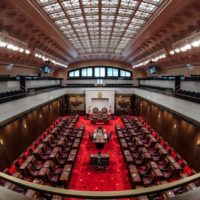News
Senate holds emergency debate on racism
More than 20 Senators joined the debate.
Senators acknowledged the longstanding systemic racism in Canada during an emergency debate on Thursday and vowed to keep the momentum of the growing movement for equality strong.
The four-hour debate was held at the request of Senator Rosemary Moodie, who shared her experiences as a black woman in Canada.
Senator Raymonde Gagné, the Legislative Deputy to the Government Representative in the Senate, spoke of the inspiring scale and scope of the global protests– and emphasized we need to seize the moment.
“Over time, we have all seen the reactions to reports of injustices or violence toward visible minorities and racialized people. There is always outrage. There is always condemnation. Investigations are undertaken and reports issued. And unfortunately, little of substance has come from them,” she said.
“Today is palpably different. A perfect storm has flipped a switch in the human consciousness. Offering sympathy, claiming empathy and paying lip service to an endemic problem is not good enough anymore. Promising change in policing, hiring practices or school admission requirements; modifying laws to ensure inclusion; and releasing report after report proposing recommendations that are praised and promptly ignored are no longer good enough.”
Senator Patti LaBoucane-Benson, an Alberta Métis Senator from the Treaty 6 territory and Government Liaison, shared her experience of delivering training to community service providers, judges, Crown prosecutors and leaders to help unpack colonial law.
“To be clear, healing is necessary for both Indigenous and non-Indigenous people. The deep misunderstandings and racist stereotypes about the first peoples of Turtle Island have deprived not only Indigenous people of their humanity, but also deprived non-Indigenous people across this country of profoundly beautiful teachings and culture. It has deprived generations of Canadians of a sacred relationship that would transform our country,” she said.
She highlighted the importance of training those people in leadership positions in order to better combat systemic racism – and to guide better policy and decision-making. Education beginning at a young age that includes truthful Indigenous histories and perspectives is also key.
Systemic racism is deadly because it creates apathy, indifference and hopelessness in service delivery. It does not compel our institutions to learn, adapt and innovate.
“We live in a country where children are neither consistently nor meaningfully taught the Indigenous perspectives of the many treaties of this country — peace and friendship treaties, treaties 1 through 11, that are at the foundation of our confederation, as well as modern treaties. Generations of Canadians have no idea that these contracts between sovereign nations set out Canada’s obligations to First Nations in exchange for sharing the land and its resources. As a result, most Canadians do not understand that Canada has not met the fiduciary obligations and responsibilities outlined in treaties,” she said.
“Systemic racism creates this vacuum of knowledge, a space where misunderstandings, stereotypes and myths about Indigenous people are more freely accepted and exchanged in our society than the truth. As the saying goes, a lie gets halfway around the world before the truth can get its pants on. At the very least, our school systems — kindergarten through post-secondary — must teach the truth, at the very least.”
Senators can request emergency debates on matters of urgent public interest. Read the full debate here.




















































